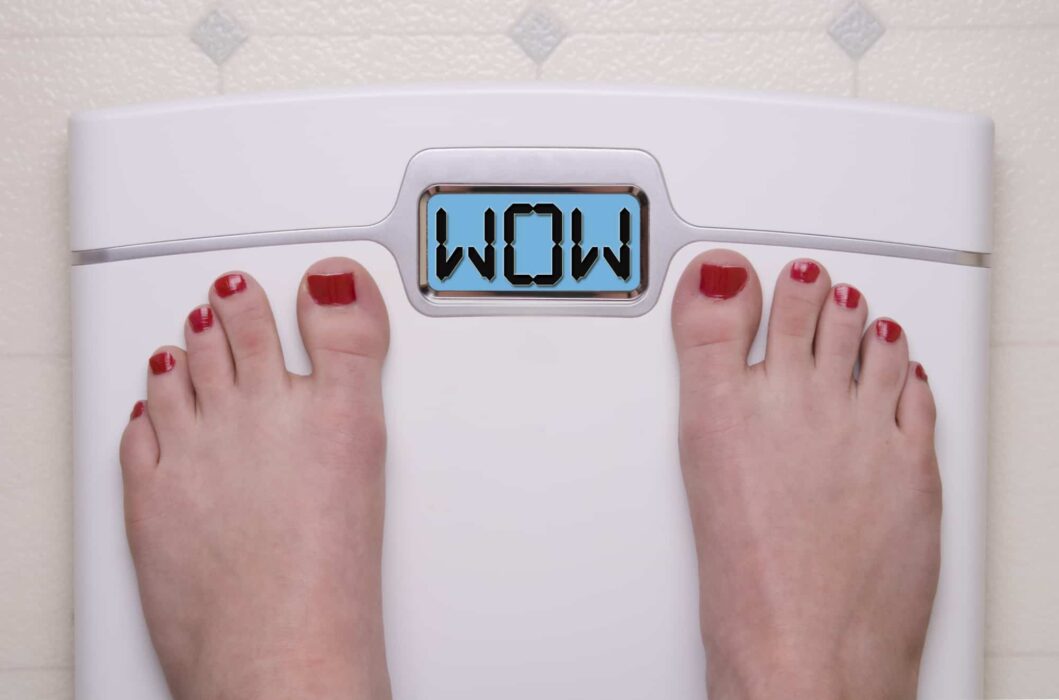The keto diet is known as a great tool for healthy weight loss and health benefits. We have already figured out how it works and how to get into ketosis to start the weight loss journey. But what kind of results can you get on a keto diet? How many pounds can you lose on keto in one month?
At the beginning of keto, you can lose about 5-7 pounds per week due to the liquid that your body quickly gets rid of. After that, weight loss slows down, and you can consistently lose 1-3 pounds per week, depending on your weight. Thus, your weight loss can reach 4-12 pounds in a month.

This question requires many details because weight loss depends on too many factors. This article will look at all the possible options and answer the most important questions regarding weight loss on keto. Let’s figure it all out together!
How Many Pounds Can You Lose on Keto in One Month?
The process of losing weight on keto and any other nutritional plan depends on many factors. And these factors are much more diverse than you think. Basic factors include your gender, age, lifestyle, and starting weight. However, this question is deeper than you think. Your weight loss is influenced by your genetics, hormonal balance, mental health, and previous dieting experience that affect your current metabolism.
How Long Does It Take to Lose 50 Pounds on Keto?
Keto is recognized as a successful tool for healthy weight loss. After all, on average, it allows you to lose more weight than on a low-fat diet without feeling hungry. [1] There is no clear answer to the question “How many pounds can I lose on keto in a month?” However, average numbers can give you an approximate answer and show what you can expect from losing weight on keto. Also, these numbers will help you understand whether you need to adjust your nutritional plan if you are not getting results.
So, the average person loses 1-3 pounds per week (4-12 pounds a month) on a keto diet after the adaptation process is complete. The big advantage of a low-carb diet is that your weight loss is sustainable if you follow all the rules. In your early days on a keto, you may lose 1 pound per day for several days, which is normal. Your body is getting rid of the liquid that it has been holding while eating carbs.
So, in the first week, you can lose 5-7 pounds if you have a large starting weight. However, remember that this is not excess fat but the liquid that leaves your body along with swelling. Once your body gets rid of it, your weight loss will slow down to 2 pounds per week on average. This weight loss is considered healthy for any diet. [2]
Can You Lose 20 Pounds in One Month on a Keto Diet?
Yes, losing 20 pounds in a month is possible on keto. Moreover, it is not difficult if you have a large initial weight. By this, I mean over 50 pounds of excess weight. Besides, the time during which you have this excess weight may matter because having excess weight for a long time will give you a slowdown in metabolism. [3] In this case, you should stick to strict keto and eliminate any processed food for the best results.
You should also be aware that while losing 20 pounds a month on keto is real, losing weight too quickly is not always healthy for your body [4]. If it’s the stress of weight loss and drastic calorie restriction, it can further slow down your metabolism and lead to several risks. They include hormonal imbalances, digestive problems, and gallstones. Also, severe food restrictions for a long time can provoke cravings for processed food and high-carb foods, which can endanger your results.
If you are a little overweight and looking to lose 20 pounds on keto in a month to pursue a perfect body, I do not advise you to do this. I have gone through a difficult path of getting rid of excess weight, and I understand that people always want to get results as quickly as possible. However, moderation is the key to success in losing weight on keto [5]. After all, the more you limit yourself and the more difficult tasks you set for yourself, the more likely you are to return to the initial weight in a short time. But if your goal is to lose a lot of excess weight in a short time (or you are forced to do it because of a health threat), then here are some healthy tips to help you do it.

Tips for Rapid Weight Loss on Keto
These tips will help anyone who wants to lose weight on keto because it is the basis of healthy weight loss on a low-carb diet. There are only four of them. Let’s look at them in more detail.
Do Clean Keto
The magic of the keto diet is that it allows you to eat any food as long as it doesn’t contain carbs. On keto, you can eat junk food without carbs, add a low-carb cake to it, and lose weight (but slowly). However, in general, the concept of the keto diet is about clean eating that is natural and healthy. Therefore, if you want to achieve great weight loss results on keto, you should avoid processed food. It also applies to excess salt, diet drinks, sweeteners, and trans fats. Instead, try eating plain meat/fish, supplementing it with lots of green vegetables, and you will see fast results.
Don’t Drink Calories
Most of the time, the keto diet doesn’t involve counting calories because a meal with healthy fats keeps you full for a long time, preventing you from eating too much. However, if you’re good at sticking to two to three keto meals a day, liquid calories can be a problem. For example, this applies to bulletproof coffee. It is actually a great breakfast option. However, one cup of rich bulletproof coffee can contain 400-800 calories. Too much, isn’t it? So if your goal is to lose weight fast on keto, you should be moderate in calories, considering all your innocent snacks on a handful of nuts and a couple of glasses of fragrant high-fat coffee.
Should I Count Calories on Keto?
Try Intermittent Fasting
A lot has been said about intermittent fasting, and there is a lot of evidence that it is an effective weight-loss tool even on a high-carb diet. [6] I have already told you about how keto and intermittent fasting work together. If you want to get great results on keto, try to start with a small restriction on your mealtimes. It will be much easier for you on keto because fatty foods saturate you for a long time and save you from sudden bursts of hunger.
Add Sports
The keto diet works well with strength training, but if you want to speed up your weight loss, then you should add cardio. For example, you can combine strength training with jogging to literally burn your fat. In addition, exercise will help you achieve a more stable state of ketosis by burning muscle glycogen. Slow-paced and prolonged exercises can help you get a better result in weight loss, switching to fat as an energy source.

Conclusion
How many pounds can you lose on keto in one month? To summarize, I can say that you can lose 4-12 pounds in a month after completing the keto adaptation process. When your body is just reaching ketosis, you can lose about 5-7 pounds in a week in the early days. However, if you add exercise, avoid excess calories, and try intermittent fasting on keto, you can increase your monthly weight loss by up to 20 pounds if you’re overweight.
In any case, the keto diet gives a constant sustainable weight loss if you follow the rules and avoid carbs. Yet, remember that sudden weight loss is fraught with health problems and the return of excess weight.
Sources:
- Ting, R., Dugré, N., Allan, G. M., & Lindblad, A. J. (2018). Ketogenic diet for weight loss. Canadian family physician Medecin de famille canadien, 64(12), 906.
- Ashtary-Larky, D., Ghanavati, M., Lamuchi-Deli, N., Payami, S. A., Alavi-Rad, S., Boustaninejad, M., Afrisham, R., Abbasnezhad, A., & Alipour, M. (2017). Rapid Weight Loss vs. Slow Weight Loss: Which is More Effective on Body Composition and Metabolic Risk Factors?. International journal of endocrinology and metabolism, 15(3), e13249. https://doi.org/10.5812/ijem.13249
- Singla, P., Bardoloi, A., & Parkash, A. A. (2010). Metabolic effects of obesity: A review. World journal of diabetes, 1(3), 76–88. https://doi.org/10.4239/wjd.v1.i3.76
- Ferraro, Z. M., Patterson, S., & Chaput, J. P. (2015). Unhealthy weight control practices: culprits and clinical recommendations. Clinical medicine insights. Endocrinology and diabetes, 8, 7–11. https://doi.org/10.4137/CMED.S23060
- Dashti, H. M., Mathew, T. C., Hussein, T., Asfar, S. K., Behbahani, A., Khoursheed, M. A., Al-Sayer, H. M., Bo-Abbas, Y. Y., & Al-Zaid, N. S. (2004). Long-term effects of a ketogenic diet in obese patients. Experimental and clinical cardiology, 9(3), 200–205.
- Rynders, C. A., Thomas, E. A., Zaman, A., Pan, Z., Catenacci, V. A., & Melanson, E. L. (2019). Effectiveness of Intermittent Fasting and Time-Restricted Feeding Compared to Continuous Energy Restriction for Weight Loss. Nutrients, 11(10), 2442. https://doi.org/10.3390/nu11102442